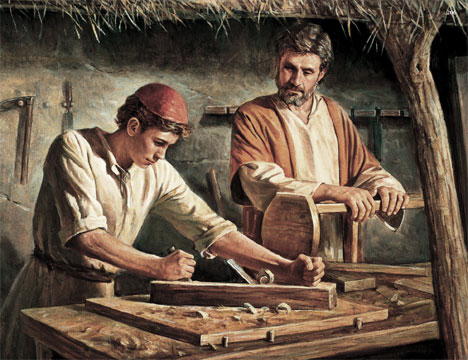Educating Jesus
 “And, most heartbreaking, most breathtaking of all, is His willingness to actually become the veil, the flesh that was torn away to reveal the “naked” mind of the Father, the unhidden face of His mission for a bride for His Son.”
“And, most heartbreaking, most breathtaking of all, is His willingness to actually become the veil, the flesh that was torn away to reveal the “naked” mind of the Father, the unhidden face of His mission for a bride for His Son.”
“And the Lord was sorry that he had made man on the earth, and it grieved him to his heart.” (Genesis 6:6)
“But concerning that day and hour no one knows, not even the angels of heaven, nor the Son, but the Father only. For as were the days of Noah, so will be the coming of the Son of Man.” (Matthew 24:36-37)
The relationship between the Father and the Son is an eternal to-and-fro. It is this primary “chiasm,” a “there-and-back-again,” a forming and a filling, which gave shape to the Creation Week and every facet of the Word of God and of human life.
This post has been slain and resurrected for inclusion in my 2015 book of essays, Inquietude.
You must be logged in to see the rest of this post.
Join now for a year for $15!


























April 12th, 2013 at 3:02 pm
I have a very strong suspicion you are onto something very important. Are you suggesting that every time God speaks in the Old Testament it is the voice of the Son, not the Father, speaking? So we actually never hear a direct word from the Father which isn’t being filtered by the Son’s limited understanding? So you can say, as some do, that God “matured” throughout the Old Testament while still holding that He is the same yesterday, today, and tomorrow?
April 12th, 2013 at 3:05 pm
You’re sharp, as always.
Yes. Although there is the “let US go down” language concerning the judgment of Babel.
I sent this to a friend with the warning that it might sound like heresy. He replied,
“Not heresy, but quite possible theology. Jesus was perfected through suffering. I agree that something develops in the Son through his experiences. Extending that back in time to the creation is a novel step, but it’s not radical, it’s just an extension of what we already know about Jesus from the new testament. I could be convinced.”
And I replied,
“It means his earthly life was a microcosm of all human history, which makes sense if all the world was created in Him and judged in Him. And the idea makes me love Him even more.”
April 12th, 2013 at 3:13 pm
I’m not sure that the “maturing” of the Son would have affected the words He spoke as the Father’s representative. This is the picture we get in John’s Gospel, and also in Hebrews. The Son IS the infallible Word, yet He is a person, and a Mediator.
So this means we can’t claim that anything God says in the Old Testament was incorrect. It was perfect for the time and the situation, and the Father who initially spoke those Words knew everything from the beginning, when Jesus was the Lamb slain from the foundation of the world.
The more I chew on it, I’ve found this idea sheds new light, or puts a wonderful new spin, on many texts. Imagine if the Son had no idea what the Father intended when He commanded the sacrifice of Isaac in perfect obedience? Was He the Angel sent to stop it? “Before Abraham was, I am.”
April 13th, 2013 at 7:42 pm
Here’s another one…
“I glorified you on earth, having accomplished the work that you gave me to do. And now, Father, glorify me in your own presence with the glory that I had with you BEFORE THE WORLD EXISTED.”
April 14th, 2013 at 10:11 am
Fascinating, keep going
April 17th, 2013 at 4:13 am
Is the word Yahweh more closely related to Jesus than to the Father? The word doesn’t appear in Genesis until after the first creation account. I’ve heard preachers say that the Angel of Yahweh in the OT was Jesus, and I haven’t heard anyone disagree with that. Is it too much of a stretch to simply say Yahweh himself was Jesus? Don’t know my Hebrew grammar too well yet, but could “Angel of Yahweh” be translated “Angel Yahweh”?
April 17th, 2013 at 4:14 am
*The significance of Yahweh appearing after first creation account being that the name is connected with creation.
April 17th, 2013 at 9:45 am
Interesting.
I’m pretty sure both Leithart and Jordan have written or said that Yahweh was Jesus, being the Word, but they would not take it this far.
April 17th, 2013 at 9:46 am
Another thought: the final test for Abraham was the offering of his son. Likewise, the final act of servanthood for Jesus would be, in this scenario, the incarnation, a microcosm of the whole.
April 17th, 2013 at 9:30 pm
Matt Jepsen has some (possibly) related comments here:
http://moscowcoffeereview.com/carpecakem/2013/04/08/calling-on-a-host-of-angels/
May 21st, 2013 at 4:32 am
Just read this post by Andrew Perriman: http://postost.net/2013/05/shema-important-understanding-one-god-one-lord
I’m curious about your take on what he says about Psalm 110. The Lord (Jesus) sitting at the right hand of the LORD (Yahweh) implies they’re not the same person. Thoughts?
May 21st, 2013 at 9:15 am
Good point. Seems God isn’t as concerned with identity so much as with roles, which makes Him Trinitarian.
The “I Am” is the “source” of Covenant authority. To the Son, the Father is the I Am. To the Covenant people, Jesus is the I Am, as He Himself says. Psalm 110 puts the Father at Transcendence and the Son at Hierarchy. But the Son is still transcendent.
http://www.bullartistry.com.au/wp/2010/12/17/heads-will-roll/